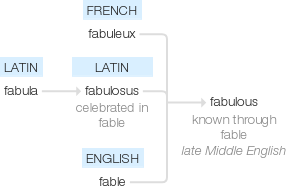Fabulous
late Middle English (in the sense ‘known through fable’): from French fabuleux or Latin fabulosus ‘celebrated in fable’, from fabula (see fable).
wiktionary
Borrowed from Latin fābulōsus(“celebrated in fable”).
etymonline
fabulous (adj.)
early 15c., "mythical, legendary," from Latin fabulosus "celebrated in fable;" also "rich in myths," from fabula "story, tale" (see fable (n.)). Meaning "pertaining to fable" is from 1550s. Sense of "incredible" first recorded c. 1600, hence "enormous, immense, amazing," which was trivialized by 1950s to "marvelous, terrific." Slang shortening fab first recorded 1957; popularized in reference to The Beatles, c. 1963.
Fabulous (often contracted to fab(s)) and fantastic are also in that long list of words which boys and girls use for a time to express high commendation and then get tired of, such as, to go no farther back than the present century, topping, spiffing, ripping, wizard, super, posh, smashing. [Gower's 1965 revision of Fowler's "Modern English Usage"]
Related: Fabulously; fabulousness.
